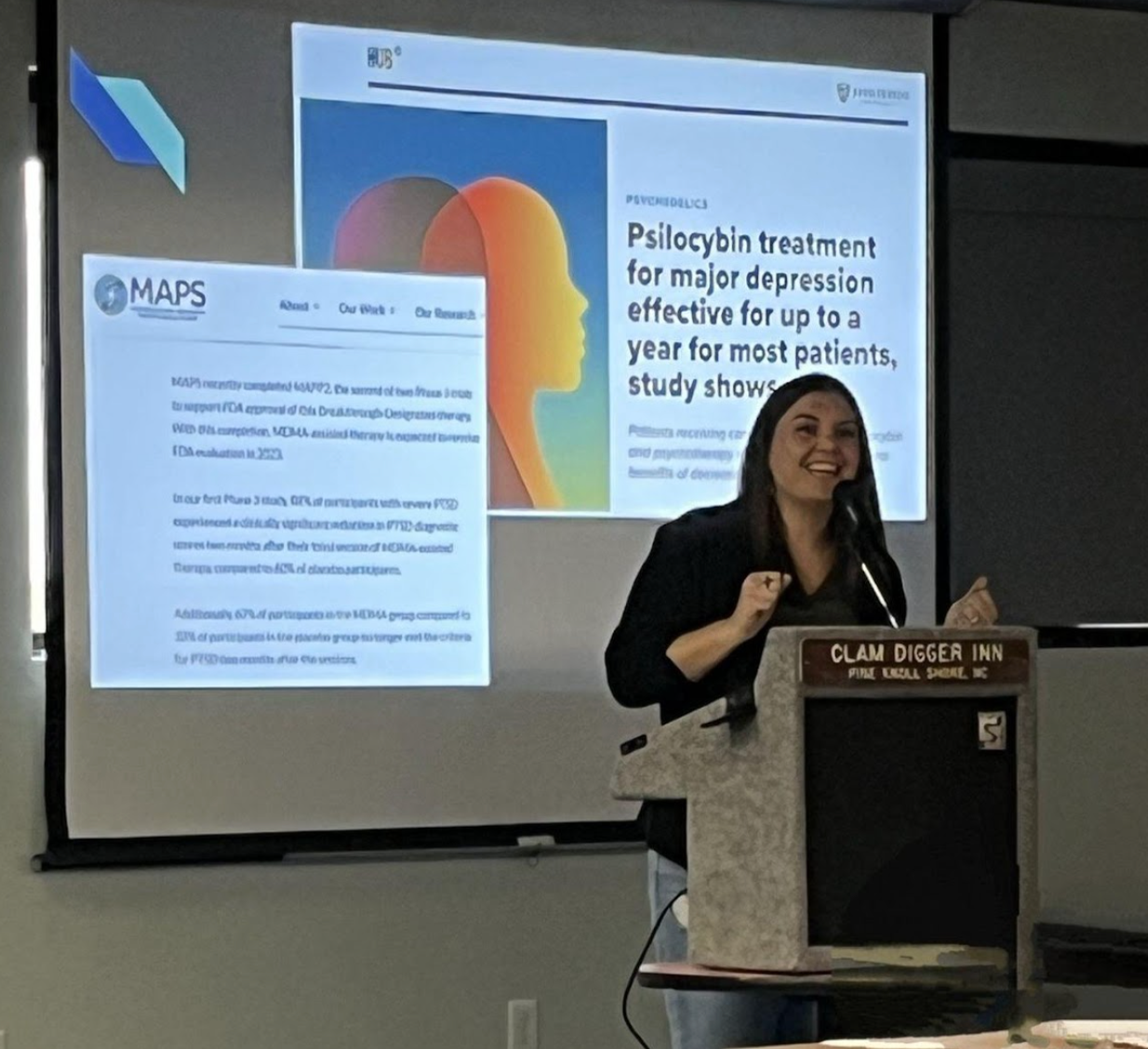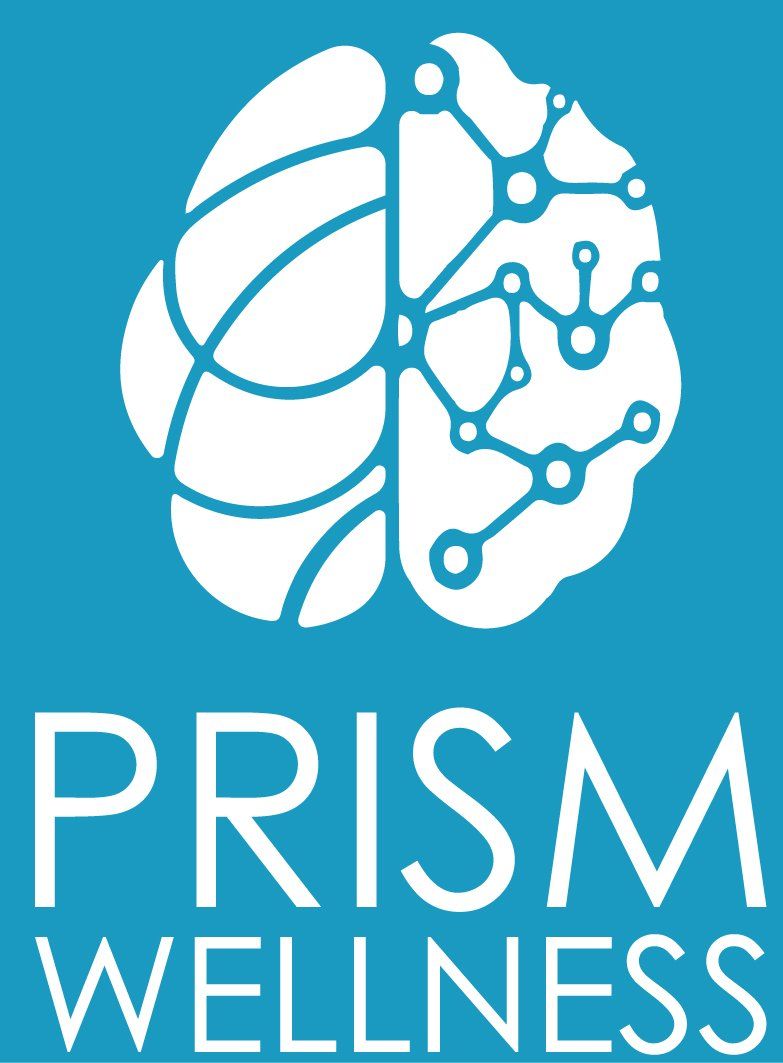Prism Wellness
Psychedelics and Therapy
Psychedelics have become a hot issue recently. There are many podcasts, documentaries, books, and television shows that are shining a light on healing medicines that have been around for decades (like MDMA) and millennia (like psilocybin). Both MDMA and psilocybin (“magic mushrooms”) have been granted a “Breakthrough Status” by the FDA due to the positive outcomes of various studies. According to the Multidisciplinary Association for Psychedelic Studies (2017), “By granting Breakthrough Therapy Designation, the FDA has agreed that this treatment may have a meaningful advantage and greater compliance over available medications for PTSD.” Psylocibin also has been grated FDA Breakthrough Therapy Designation for the treatment of Treatment-Resistant Depression.
Ketamine and esketamine (Spravato) have also had increasingly more attention in doctor’s offices across the US due to it’s ability to assist clients in reducing depression and attending to suicidality. Many people are interested in learning if psychedelic assisted psychotherapy is right for them, but not sure where to look for guidance. While both MDMA and Psilocybin remain a Schedule I drug (thus indicating no therapeutic value) and remain Federally illegal, many states have taken measures to decriminalize the substances. Ketamine, however, is legal and attainable off-label through a prescription to address mental health concerns like depression, anxiety, and suicidality. Ketamine has been long used as an anesthetic, but given in lower doses, Ketamine has the ability to act as a rapidly acting anti-depressant. Ketamine, nor Spravato, however, are a cure-all or a quick fix, nor will they work for everyone. It is important to note that while it is exciting that Ketamine and other psychedelics have had an influx in published studies and articles, more studies are needed to confirm long-term efficacy and best practices.
Ketamine Assisted Psychotherapy in Cary, NC
In recent years, the field of psychotherapy has witnessed a revolutionary approach to treating depression, PTSD, and suicidality through using ketamine-assisted psychotherapy (KAP). While ketamine has long been recognized for its anesthetic properties, its potential as a therapeutic tool has gained significant attention over the past decade. It is important for consumers to know the difference between traditional Ketamine treatment (medical model) and Ketamine Assisted Psychotherapy (holistic model). Using Ketamine for the treatment of anxiety, depression, PTSD, substance use disorders, and OCD is considered off-label.
What is the Process of Ketamine Assisted Psychotherapy?
Traditional ketamine treatment often involves a medical intake assessment and evaluation and information sharing, however patients are left on their own (at times with a camera in the room) during the actual Ketamine experience. Afterwards, patients are screened for medical stability, then they are driven home by a trusted friend or family member. Follow up sessions with the prescriber may inquire effectiveness or explore results the patient felt, and additional Ketamine sessions are typically recommended.
Step 1 - Preparation
KAP, on the other hand, utilizes a more therapeutic approach which includes preparation sessions, medicine sessions, and integration sessions with a licensed psychotherapist who is specially trained in providing Ketamine Assisted Psychotherapy.
KAP includes several preparatory sessions prior to a medicine session. Preparation sessions include obtaining a full biopsychosocial assessment, exploring expectations for treatment, identifying goals or intentions for treatment, thoroughly going over informed consent, hopes and fears, music choices for sessions and comfort items that may be brought to the session. Preparation sessions promote comfort because clients gain a greater understanding of what is likely to occur, supports in place, and how to work with any potential challenges.
Preparation sessions are just as important as the medicine sessions and often reduce anxiety going into KAP sessions. There is no timeframe for the preparation phase—it completely depends on the person’s experiences, history, ability to practice mindfulness, and feelings of safety with the psychotherapist and medical provider.
Step 2 - Therapeutic Support
Next comes the therapeutic support during the actual Ketamine session. Psychotherapists are not able to prescribe medication, thus many KAP psychotherapists have relationships with prescribers to allow for the therapist to be present during the session.
A therapist’s role in a KAP session is to provide support when needed, though clients are encouraged to have an “Inner Directed Approach,” i.e. work with the self to explore what comes up vs. being guided by or asked questions by the psychotherapist as in typical talk therapy.
A psychotherapist may take notes of things clients say out loud during the session, assist with music, remind the client to take slow, deep breaths if they begin to feel overwhelmed, or simply be a safe presence in the room with the client. KAP therapists may also provide other types of therapeutic support.
Step 3 - Integration
The final stage of KAP is integration work. Integration is when a client reflects on insight gained from a Ketamine session and how to implement these insights into their life to achieve lasting change. Often times, clients will leave a Ketamine session with fresh outlooks, however, they have no idea how to challenge patterns of behavior to allow for sustained changes in their lives. A specially trained KAP therapist will assist clients in exploring these insights and applying them to their lives to promote the desired outcome that brought the client to KAP in the first place.
Research suggests that ketamine may have positive effects on neuroplasticity, the brain's ability to reorganize and form new connections. Ketamine has been found to promote the growth and resilience of neurons, potentially rewiring neural pathways associated with mental health conditions. This neuroplasticity can enhance learning, memory, and adaptive behaviors, providing a foundation for long-lasting therapeutic benefits. Neuroplasticity as a result of Ketamine, however, does not last indefinitely. This is why specific integration coaching is so helpful for those who wish to explore Ketamine to promote their mental health and wellness.
As research in this field continues to evolve, it is crucial to further explore and refine the application of ketamine-assisted psychotherapy. If you wish to learn more about Psychedelic Assisted Psychotherapy, check out the MAPS website. By harnessing the positive effects of these novel approaches, we can potentially revolutionize mental health care and provide hope to individuals who have been living with the burdens of their conditions.
Prism Wellness, PLLC currently offers KAP through the following providers:
Lesley Kellogg, LCMHC, LCAS, NCC (MAPS, Fluence, Polaris, Synthesis Institute)
Madi West, LCMHC, NCC (Fluence, Perusing KAP Certification through Triangle Wellness & Recovery)
Emma Socha, LCMHCA (Fluence, Perusing KAP Certification through Triangle Wellness & Recovery)
Eliza Burgess, LCMHCA(Fluence, Perusing KAP Certification through Triangle Wellness & Recovery)
All providers at Prism Wellness are committed to ongoing learning and consultation. Prism coordinates internal bi-weekly consultation, as well as external consultation with pioneers in the field of KAP and Integration.
Interested in KAP? Reach out to us at Info@PrismWellnessNC.com

Lesley Kellogg, LCMHC, LCAS, NCC is a trauma-focused psychotherapist who believes in the healing properties that psychedelic assisted therapy can bring to the millions of Americans that suffer from PTSD, depression, and many other mental health conditions. Lesley currently partners with local prescribers to offer KAP to clients wishing to receive support before, during, and after Ketamine sessions to seek out lasting changes.
Lesley has completed 100 hours of training through the Multidisciplinary Association for Psychedelic Studies (MAPS) for MDMA Assisted Psychotherapy (upon hopeful FDA Approval in 2024), Ketamine Assisted Psychotherapy through Polaris Insight Center, and Preparation and Integration Therapy, and Ketamine Assisted Psychotherapy through Polaris. Lesley continues to pursue in depth and experiential training and actively seeks continuing education through reflecting on research, published books, and podcasts with guest speakers from psychedelic clinical trials.
Lesley equally honors the scientific application of psychedelics as well as the spiritual and ceremonial use. Clients who work with Lesley will explore cultural, spiritual, and natural supports to assist them in their therapeutic journey. Lesley highly values collaboration and maintains reciprocal relationships with a variety of professionals from various backgrounds to promote effective care while honoring culture, race, spirituality, and overall health and wellness.
Lesley is a member of the American Psychedelic Practitioners Association.

Lesley also offers Psychedelic Integration Therapy. Psychedelic Integration Therapy can include the preparation before and/or reflection of a past experience with psychedelics. Preparation for use is extremely important and can mitigate what people often label as a "bad trip." Integration work prior to an experience is a way to reduce potential harm. Mindfully exploring your biopsychosocial world experience can bring light into how factors such as family dynamics, trauma history, race, ethnicity, gender, sexual orientation, beliefs about psychedelics, etc. prior to a psychedelic experience can reduce the feelings of anxiety or fear a person may have prior to, during, and after the experience.
Integration work post psychedelic journey is a critical part in healing that many people forget. Psychedelics promote neuroplasticity, meaning our brain's ability to create new pathways in our brain to aid us in creating new, healthy and desired patterns and behaviors. If not reinforced, insights gained during a psychedelic experience may be reflected on as a memory, but not implemented into one's life and create a lasting change. Working with an integration professional can promote a client's likelihood of maintaining purposeful change.
Psychedelic Integration Therapy includes the following:
- Informed Consent (reviewing expectations of therapy, therapeutic modalities utilized, limitations of care, therapist training/background, etc)
- Clients may reach out days, months, or years before or after a psychedelic experience (curious inquiry is okay!)
- Exploring intentions for psychedelic use
- Processing psychedelic journey and reflecting on how to integrate insights into everyday life
- Learn from past challenging psychedelic experiences i.e. "bad trips"
Psychedelic Integration Therapy does not include:
- Therapist is not present if or when a psychedelic is ingested but can assist in identifying resources for support. Therapist does not endorse specific resources.
- Therapist does not recommend or encourage a specific path or medicine
- Therapist does not provide referrals to "underground" (illegal) psychedelic services
- Any information received is for educational purposes and not to be misconstrued as medical or legal advice
Those interested in Psychedelic Assisted Psychotherapy or licensed therapists seeking employment with Prism Wellness to assist in providing psychedelic assisted therapy can reach out to Lesley at Lesley@PrismwellnessNC.com
Lesley was a guest on the Finding New Waters podcast, through New Waters Recovery in Raleigh, North Carolina. Finding New Waters is hosted by New Waters Recovery Medical Director, Dr. Harold Hong and CEO and Founder, Graham Doerge. Join us as we delve into the transformative world of psychedelics. In this captivating podcast, therapist Lesley Kellogg shares her profound insights on the power of psychedelic-assisted therapy. Discover how these substances open new pathways in the brain, facilitate healing experiences, and offer unique opportunities for personal growth. Learn about integration, therapeutic support, and the importance of individualized approaches. You can find the podcast on Spotify, Apple Podcasts, or YouTube.
As research in this field continues to evolve, it is crucial to further explore and refine the application of ketamine-assisted psychotherapy. If you wish to learn more about Psychedelic Assisted Psychotherapy, please check out the resources listed below. By harnessing the positive effects of these novel approaches, we can potentially revolutionize mental health care and provide hope to individuals who have been living with the burdens of their conditions.
Resources
- Multidisciplinary Association for Psychedelic Studies
- www.MAPS.org
- Fireside Project
- www.FireSideProject.org
- Erowid
- https://www.erowid.org/
- ● Alex Belser: The Psychedelic Mystical Experience
- https://www.youtube.com/watch?v=BE80piBCdNs
- Psychedelic Passage
- https://www.psychedelicpassage.com/
- Psychological flexibility mediates the relations between acute psychedelic effects and subjective decreases in depression and anxiety
- https://reader.elsevier.com/reader/sd/pii/S2212144719301206?token=9E44EF880FAD8AE51A19D08678057AA53B793280F6484CE12B83BB33888E17342D1CC90F412331B0F487821203B63F35
- Antidepressant, anxiolytic, and anti-addictive properties of Classic Psychedelics
- https://journals.sagepub.com/doi/pdf/10.1177/2045125316638008
- ● Psychedelic Psychiatry’s Brave New World
- https://www.cell.com/cell/pdf/S0092-8674(20)30282-8.pdf?_returnURL=https%3A%2F%2Flinkinghub.elsevier.com%2Fretrieve%2Fpii%2FS0092867420302828%3Fshowall%3Dtrue
- MDMA-Assisted Psychotherapy: How Different is it from Other Psychotherapy?
- https://maps.org/news-letters/v23n1/v23n1_p10-14.pdf
- A Manual for MDMA-Assisted Psychotherapy in the Treatment of PTSD
- https://maps.org/research/mdma/mdma-research-timeline/4887-a-manual-formdma-assisted-psychotherapy-in-the-treatment-of-ptsd
- Posttraumatic Growth Article (Gorman et al, 2020)
- https://onlinelibrary.wiley.com/doi/full/10.1002/jts.22479
- The influence of therapists’ first-hand experience with psychedelics on psychedelic-assisted psychotherapy research and therapist training (Nielson & Guss, 2018)
- https://akjournals.com/view/journals/2054/2/2/article-p64.xml
- Learning to Let Go: A Cognitive-Behavioral Model of How Psychedelic Therapy Promotes Acceptance
- https://www.frontiersin.org/articles/10.3389/fpsyt.2020.00005/full
- ● This is the ACT inspired work
- https://www.sciencedirect.com/science/article/pii/S2212144719301140
- ● The Center for Optimal Living (Integrative Harm Reduction Psychotherapy training)
- https://www.centerforoptimalliving.com/
- Willoughby Britton and Jared Lindhal have a Meditation Safety Toolbox
- https://www.brown.edu/research/labs/britton/resources/meditation-safety-toolbox
- Drug harms in the UK: a multicriteria decision analysis
- https://www.thelancet.com/journals/lancet/article/PIIS0140-6736(10)61462-6/fulltext
- Project New Day
- https://projectnewday.foundation/about-us/
- The Third Wave
- https://thethirdwave.co/
- ● The PsychonautWIKI
- https://psychonautwiki.org/
- Spirit Pharmacist
- https://www.spiritpharmacist.com
- Psychedelic Liberty Summit
- https://chacruna.net/psychedelic-liberty-summit/
- Remedy Centre
- https://remedycentre.ca/contact-us/
- MAPS MDMA-Assisted Therapy Code of Ethics
- https://maps.org/news/bulletin/articles/436-maps-bulletin-spring-2019-vol-29,-no-1/7710-maps-mdma-assisted-psychotherapy-code-of-ethics-spring-2019
- All NPV Sweden Videos:
- ● https://www.youtube.com/channel/UCPnZFa_ln0VoBWjVZS15LLA\
- The Trip Treatment: Michael Pollen's 2015 New Yorker Article
- https://www.newyorker.com/magazine/2015/02/09/trip-treatment
- Psychologists’ responsibility to society: Public policy and the ethics of political action (Allen & Dodd, 2018)
- https://psycnet.apa.org/record/2018-00350-001
- New research on the action of LSD on serotonin receptors
- https://cen.acs.org/environment/pollution/Crystal-structure-shows-LSDbound/98/i36
- Portraits from LSD Session (historical)
- http://www.openculture.com/2013/10/artist-draws-nine-portraits-on-lsd-during-
- 1950s-research-experiment.html
- Washington Post article on access to psychedelic medicine
- https://www.washingtonpost.com/magazine/2020/09/21/psychedelic-medicinewill-it-be-accessible-to-all/?arc404=true
- Race as an element of "Set and Setting"
- https://akjournals.com/view/journals/2054/4/1/article-p51.xml
- MDMA for PTSD: Mechanisms of action
- https://www.researchgate.net/publication/323631269_MDMAassisted_psychotherapy_for_PTSD_Are_memory_reconsolidation_and_fear_extinction_underlying_mechanisms
- Psychedelics are not liked to mental health problems or suicidal behavior
- https://www.researchgate.net/publication/273154807_Psychedelics_not_linked_to_mental_health_problems_or_suicidal_behavior_A_population_study
- Confrontation with the Unconscious
- https://www.goodreads.com/book/show/18708468-confrontation-with-theunconscious
- Portland Integration Network
- https://www.portlandintegrationnetwork.com/
- Zendo Project
- https://zendoproject.org
- Trust surrender receive, MDMA
- https://www.amazon.com/Trust-Surrender-Receive-Release-Trauma/dp/1619617382
- Listening to Ayahuasca
- https://www.amazon.com/Listening-Ayahuasca-Depression-Addiction-Anxiety/dp/1608684024
- Free Books from MAPS
- https://maps.org/resources/freebooks
- Conscious Medicine
- https://www.amazon.com/Consciousness-Medicine-Indigenous-Entheogens-Expanded-ebook/dp/B07H6Z3JXB
- Ryan Westrum’s Psychedelic Handbook
- https://www.amazon.com/Psychedelics-Integration-Handbook-Ph-DWestrum/dp/173387660X
- “Therapeutic Assessment”
- https://www.therapeuticassessment.com/
- ACT-Psilocybin Therapy for Depression Manual
- https://psyarxiv.com/u6v9y/ A
- Peer-reviewed article describing the approach
- https://www.sciencedirect.com/science/article/pii/S2212144719301218
- Links for YouTube Videos - Elizabeth Nielson produced by NPV Sweden:
- MDMA-Assisted therapy for PTSD: Karolinska Institute
- https://www.youtube.com/watch?v=oebmUaZcN8k&list=UUPnZFa_ln0VoBWjVZS15LLA&index=1
- ● Psilocybin for Alcohol Use Disorder: Karolinska Institute
- https://www.youtube.com/watch?v=I4UFJYpCqkA&list=UUPnZFa_ln0VoBWjVZS15LLA&index=5
- The need for Psychedelic Harm Reduction and Integration in Clinical Settings:
- Colloquium on Psychedelic Psychiatry
- https://www.youtube.com/watch?v=yoqaK9ah7Xs&list=UUPnZFa_ln0VoBWjVZS15LLA&index=14

